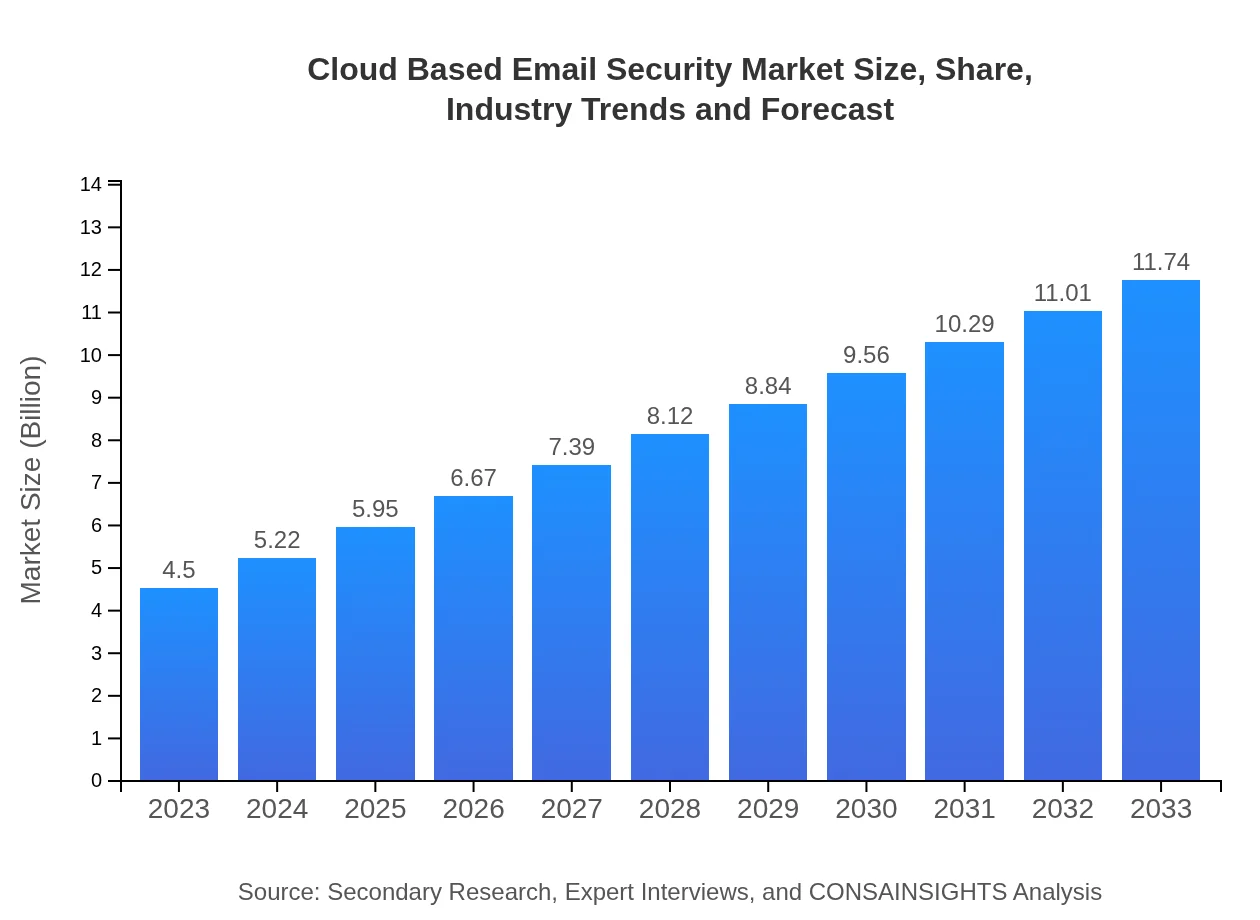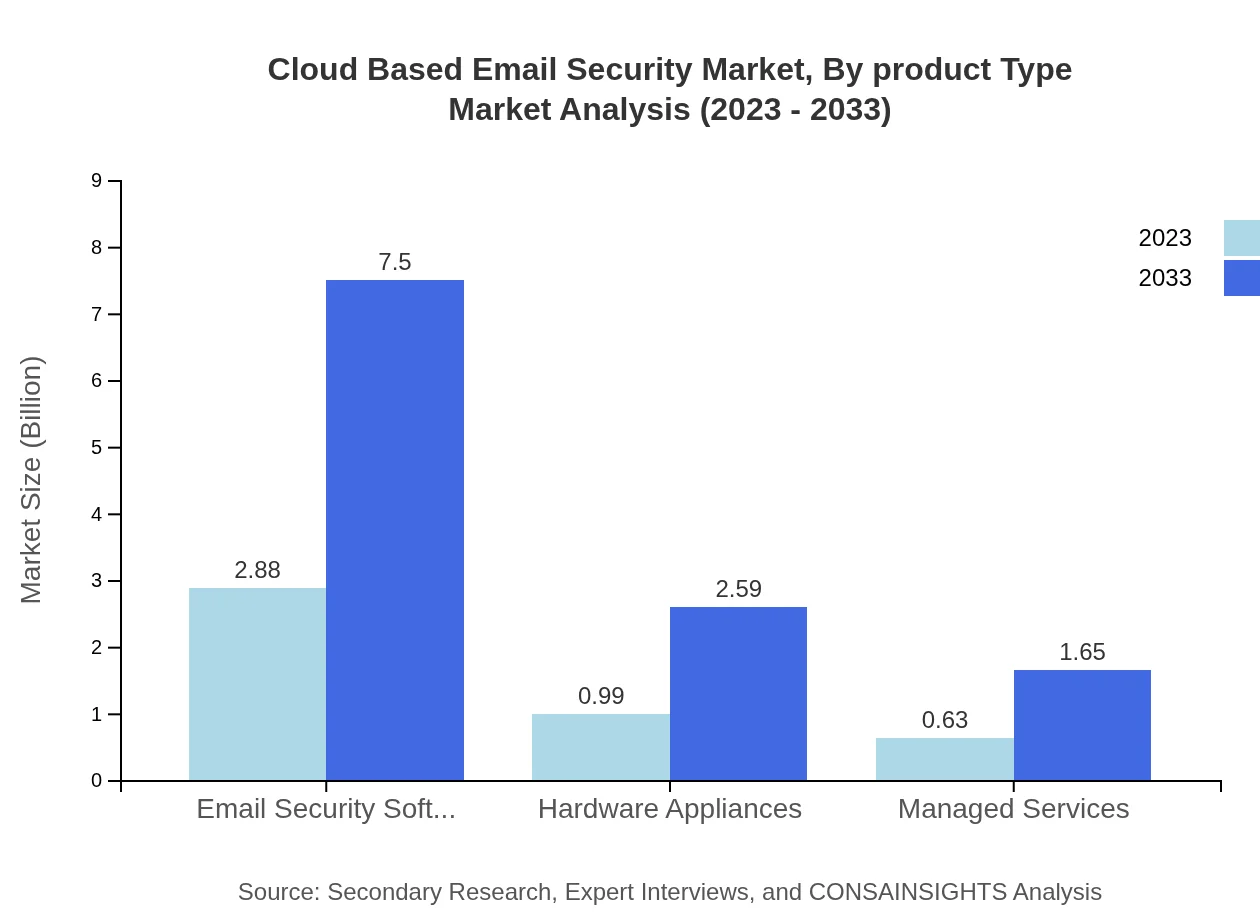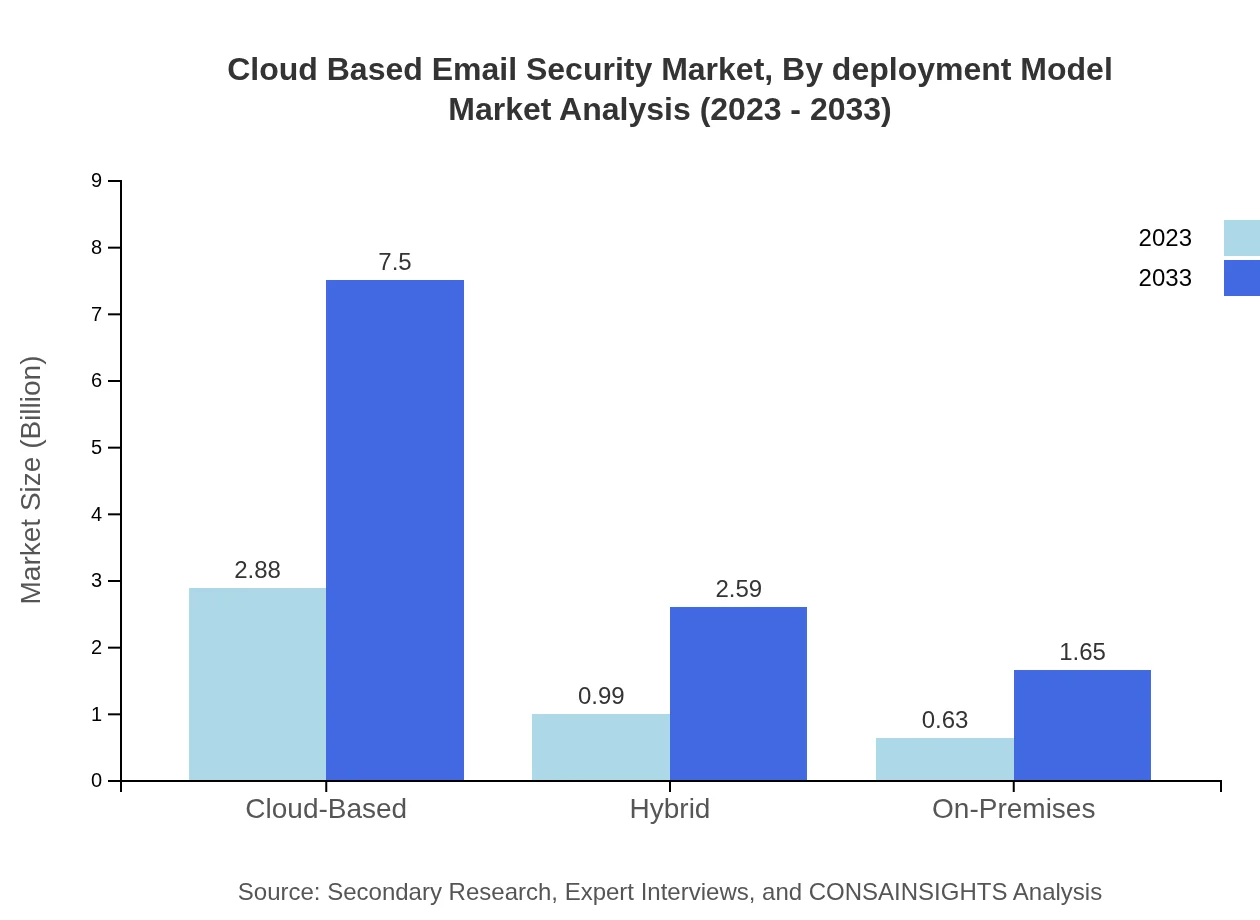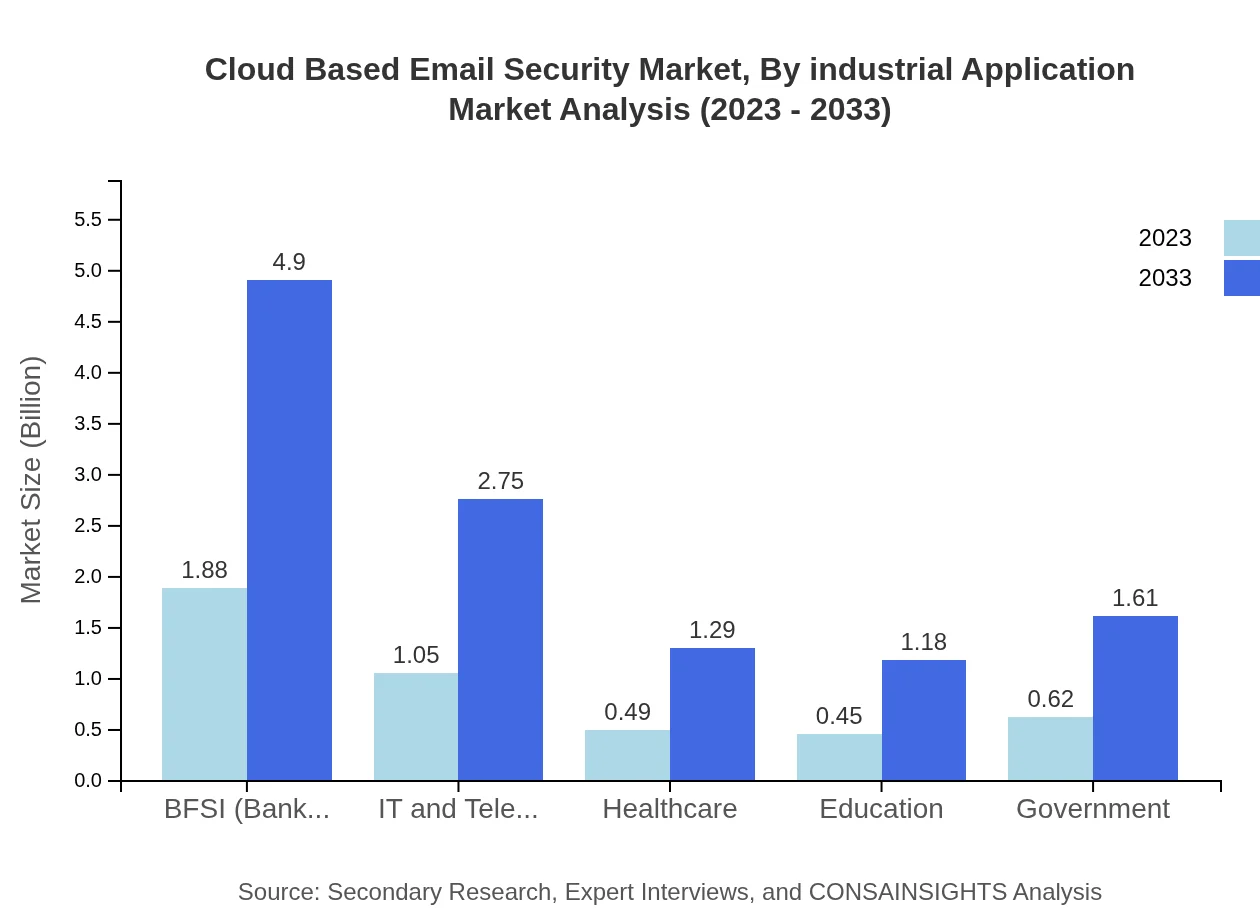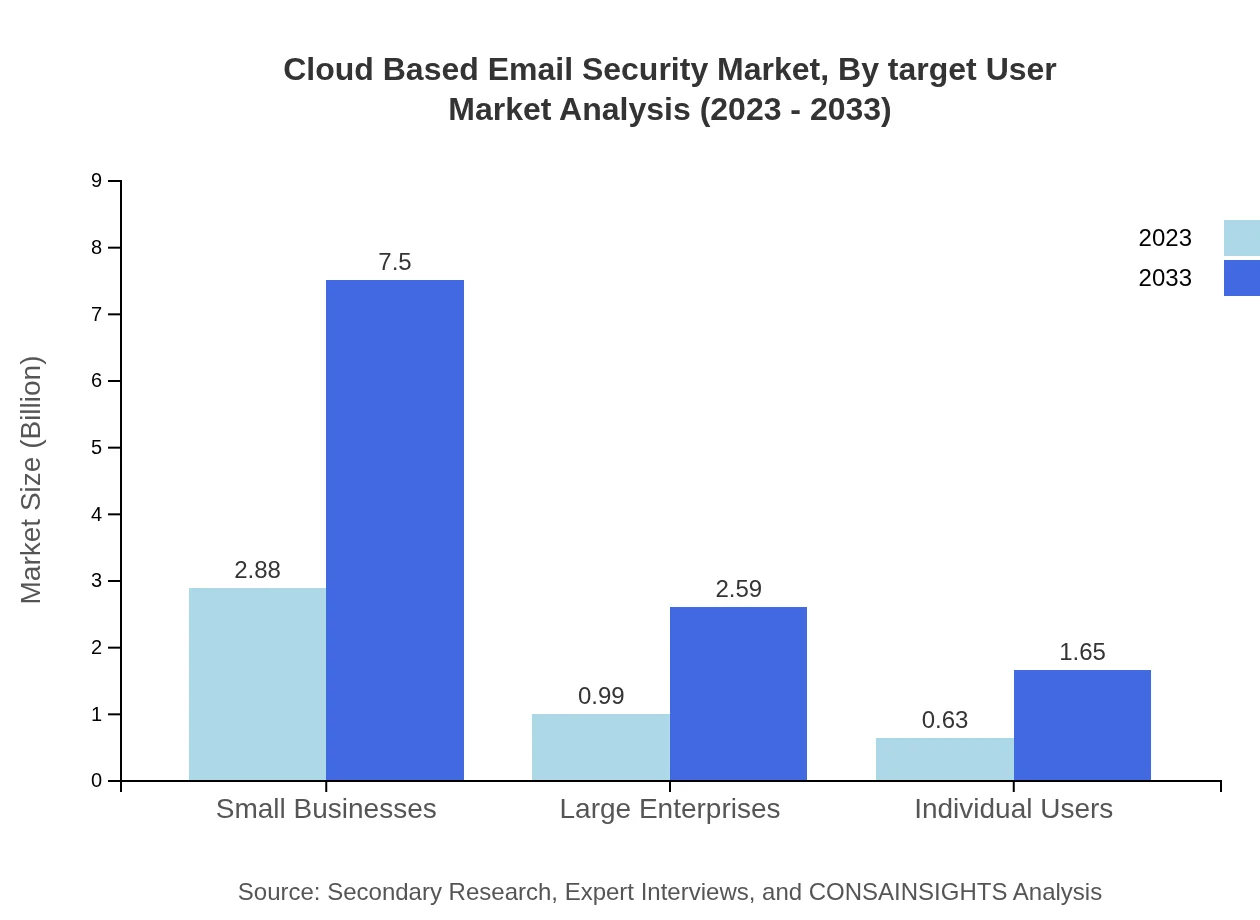Cloud Based Email Security Market Report
Published Date: 31 January 2026 | Report Code: cloud-based-email-security
Cloud Based Email Security Market Size, Share, Industry Trends and Forecast to 2033
This report analyzes the Cloud Based Email Security market, providing insights into market size, trends, and projections for the years 2023 to 2033, covering various segments and regions.
| Metric | Value |
|---|---|
| Study Period | 2023 - 2033 |
| 2023 Market Size | $4.50 Billion |
| CAGR (2023-2033) | 9.7% |
| 2033 Market Size | $11.74 Billion |
| Top Companies | Proofpoint, Mimecast, Barracuda Networks, Cisco, Microsoft |
| Last Modified Date | 31 January 2026 |
Cloud Based Email Security Market Overview
Customize Cloud Based Email Security Market Report market research report
- ✔ Get in-depth analysis of Cloud Based Email Security market size, growth, and forecasts.
- ✔ Understand Cloud Based Email Security's regional dynamics and industry-specific trends.
- ✔ Identify potential applications, end-user demand, and growth segments in Cloud Based Email Security
What is the Market Size & CAGR of Cloud Based Email Security market in 2023?
Cloud Based Email Security Industry Analysis
Cloud Based Email Security Market Segmentation and Scope
Tell us your focus area and get a customized research report.
Cloud Based Email Security Market Analysis Report by Region
Europe Cloud Based Email Security Market Report:
The European market is anticipated to grow from USD 1.60 billion in 2023 to USD 4.17 billion by 2033. The strong regulatory environment, including GDPR, mandates organizations to adopt stringent security measures, including robust email protection protocols. Additionally, the increasing sophistication of cyber threats calls for enhanced email security solutions.Asia Pacific Cloud Based Email Security Market Report:
In the Asia Pacific region, the Cloud Based Email Security market is valued at approximately USD 0.85 billion in 2023, projected to grow to USD 2.23 billion by 2033. This growth is attributed to the rapid digital transformation across enterprises and increasing cyber threats in emerging economies. Governments are also enacting policies favoring cloud adoption, which further drives investment in email security solutions.North America Cloud Based Email Security Market Report:
North America is a key market, boasting a size of USD 1.47 billion in 2023, expected to grow to USD 3.84 billion by 2033. The region is characterized by high levels of technological adoption and awareness of cyber threats. Major corporations and government agencies prioritize robust cybersecurity measures, significantly impacting the demand for advanced email security solutions.South America Cloud Based Email Security Market Report:
The South American market is smaller, with a size of approximately USD 0.32 billion in 2023, forecasted to reach USD 0.83 billion by 2033. Factors such as growing internet penetration and an awareness of cybersecurity threats contribute to increased demand for cloud-based email security solutions. Local regulations regarding data privacy and security are also influencing market growth.Middle East & Africa Cloud Based Email Security Market Report:
The Middle East and Africa region reports a market size of USD 0.25 billion, projected to reach USD 0.66 billion by 2033. Factors influencing market growth include increased targeting of organizations by cybercriminals and investments in digital infrastructure. As businesses in this region expand their digital footprints, email security solutions are becoming essential.Tell us your focus area and get a customized research report.
Cloud Based Email Security Market Analysis By Product Type
The Cloud Based Email Security market is primarily categorized into Email Security Software, Hardware Appliances, and Managed Services. In 2023, Email Security Software dominates the market with a share of 63.89%, valued at USD 2.88 billion, and is expected to grow to USD 7.50 billion by 2033. Hardware Appliances, holding 22.07% of the market, valued at USD 0.99 billion in 2023, shows extensive innovation in integrated solutions, set to reach USD 2.59 billion by 2033. Managed Services, while currently at 14.04% market share, is gaining momentum as organizations seek comprehensive security outsourcing options.
Cloud Based Email Security Market Analysis By Deployment Model
Deployment models of Cloud Based Email Security comprise Cloud-Based, Hybrid, and On-Premises solutions. Cloud-Based models dominate with 63.89% market share, anticipated to escalate from USD 2.88 billion in 2023 to USD 7.50 billion by 2033. Hybrid models are notable with 22.07% share, starting from USD 0.99 billion and rising to USD 2.59 billion as organizations balance between security and compliance. On-Premises solutions cater to specific regulatory needs, making up 14.04% of the market, transitioning from USD 0.63 billion to USD 1.65 billion in the forecast period.
Cloud Based Email Security Market Analysis By Industrial Application
Applications in sectors such as BFSI, IT and Telecom, Healthcare, Education, and Government are critical to the Cloud Based Email Security market. BFSI leads with a market size of USD 1.88 billion in 2023, expected to reach USD 4.90 billion by 2033, followed by IT and Telecom at USD 1.05 billion transitioning to USD 2.75 billion. Healthcare and Education sectors are also essential, showing resilience with their focus on compliance and protection of sensitive data, growing from USD 0.49 billion to USD 1.29 billion and USD 0.45 billion to USD 1.18 billion respectively. Government applications illustrate a continuous commitment to data protection, moving from USD 0.62 billion to USD 1.61 billion.
Cloud Based Email Security Market Analysis By Target User
Target users in the Cloud Based Email Security market are segmented into Small Businesses, Large Enterprises, and Individual Users. Small Businesses hold the majority share at 63.89%, growing from USD 2.88 billion in 2023 to USD 7.50 billion by 2033. Large Enterprises are projected to expand considerably, transitioning from USD 0.99 billion to USD 2.59 billion, while Individual Users contribute an emerging segment, increasing size from USD 0.63 billion to USD 1.65 billion. The segmentation reflects the growing need for tailored security solutions catering to diverse organizational sizes and requirements.
Cloud Based Email Security Market Trends and Future Forecast
Tell us your focus area and get a customized research report.
Global Market Leaders and Top Companies in Cloud Based Email Security Industry
Proofpoint:
A leader in cloud-based email security solutions, Proofpoint offers advanced threat intelligence to protect against phishing and malware attacks across organizational communication.Mimecast:
Mimecast provides comprehensive email security, archiving, and continuity services, leveraging a cloud-native architecture to safeguard corporate email and enhance compliance.Barracuda Networks:
Barracuda Networks specializes in security, data protection, and risk management solutions, providing innovative email security products that simplify protection and enhance threat detection.Cisco:
Cisco's email security solutions integrate advanced threat defense to protect organizations from incoming emails that may contain malware or spam, enforcing robust security across digital communications.Microsoft:
Microsoft’s cloud-based solutions, particularly Office 365, incorporate native email security mechanisms aimed at protecting user data while ensuring compliance and security against threats.We're grateful to work with incredible clients.









FAQs
What is the market size of cloud Based email security?
As of 2023, the cloud-based email security market is valued at approximately $4.5 billion, with an anticipated compound annual growth rate (CAGR) of 9.7% through 2033. This growth signifies increasing demand for enhanced email protection across sectors.
What are the key market players or companies in the cloud Based email security industry?
Prominent companies in the cloud-based email security space include Mimecast, Proofpoint, Cisco, Barracuda Networks, and Microsoft. These players are known for their innovations and comprehensive solutions addressing various email security challenges.
What are the primary factors driving the growth in the cloud Based email security industry?
Factors driving growth include the rising frequency of email-related cyberattacks, increasing regulatory compliance requirements, and the growing adoption of remote work. Additionally, heightened awareness of email security solutions among businesses further fuels the market.
Which region is the fastest Growing in the cloud Based email security market?
The fastest-growing region in the cloud-based email security market is Europe, projected to grow from $1.60 billion in 2023 to $4.17 billion by 2033. The rapid digital transformation and increasing sophistication of cyber threats are key contributors.
Does ConsaInsights provide customized market report data for the cloud Based email security industry?
Yes, ConsaInsights offers customized market report data tailored to specific needs within the cloud-based email security industry. This service allows clients to receive insights that are highly relevant to their business requirements.
What deliverables can I expect from this cloud Based email security market research project?
Upon completion of the market research project, clients can expect comprehensive reports including market size forecasts, competitive landscape analysis, regional insights, and trend identification, alongside actionable recommendations for strategic planning.
What are the market trends of cloud Based email security?
Current trends in the cloud-based email security market include a surge in artificial intelligence-driven solutions, greater emphasis on integration with overall cybersecurity frameworks, and the shifting focus toward user-friendly interfaces and automated threat response mechanisms.

